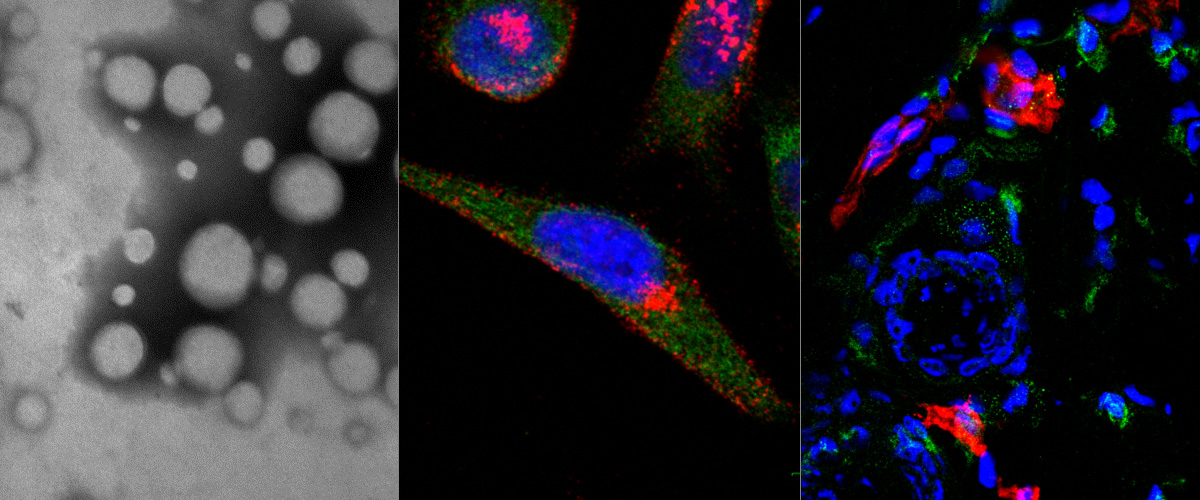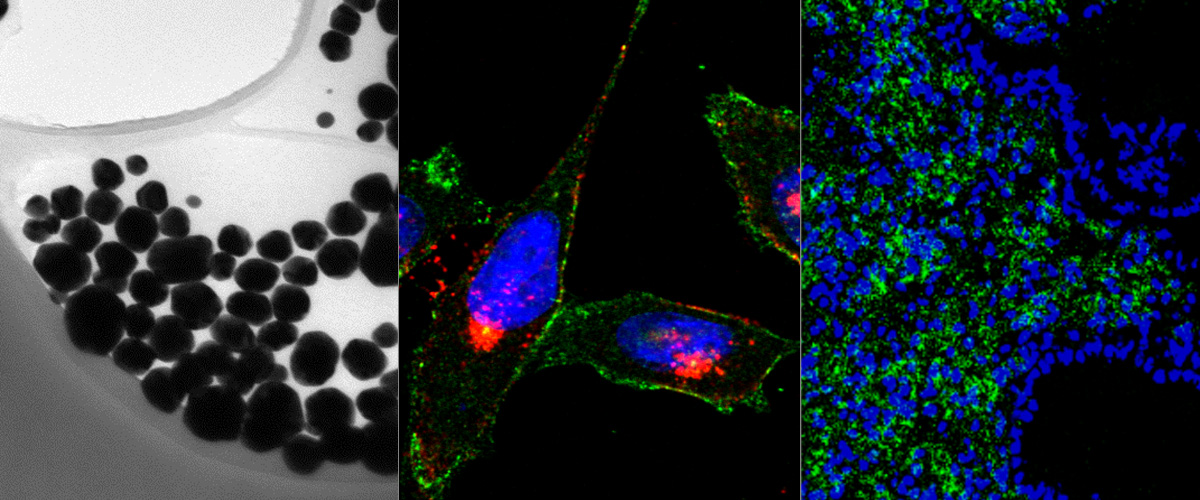Peritoneal Carcinomatosis Targeting with Tumor Homing Peptides
Simón-Gracia L, Hunt H, Teesalu T..
Molecules. 2018 May 16;23(5). pii: E1190. doi: 10.3390/molecules23051190. Review.
Application of polymersomes engineered to target p32 protein for detection of small breast tumors in mice
Simón-Gracia L, Scodeller P, Fuentes SS, Vallejo VG, Ríos X, San Sebastián E, Sidorenko V, Di Silvio D, Suck M, De Lorenzi F, Rizzo LY, von Stillfried S, Kilk K, Lammers T, Moya SE, Teesalu T.
Oncotarget. 2018 Apr 10;9(27):18682-18697. doi: 10.18632/oncotarget.24588. eCollection 2018 Apr 10.
Competition of charge-mediated and specific binding by peptide-tagged cationic liposome-DNA nanoparticles in vitro and in vivo
Wonder E, Simón-Gracia L, Scodeller P, Majzoub RN, Kotamraju VR, Ewert KK, Teesalu T, Safinya CR.
Biomaterials. 2018 Jun;166:52-63. doi: 10.1016/j.biomaterials.2018.02.052. Epub 2018 Mar 2.
New nanoparticles for detection of small breast tumors with PET imaging reported in Oncotarget
We have designed new nanoparticles that detect small breast tumors using the clinically used medical imaging modality Positron Emission Tomography (PET).
The particles are polymeric vesicles (polymersomes) made from biocompatible components polyethyleneglycol (PEG) and polycaprolactone (PCL). We found that functionalization with a tumor penetrating peptide discovered in our group ("LinTT1") boosted the accumulation of the particles in the tumor to allow sensitive detection of breast tumors modeled in mice. The polymersomes used in the study are versatile carriers that can be loaded with chemotherapeutic agents to make the drugs more selective and decrease side effects.
This work was performed in collaboration with the group of Dr. Sergio Moya at the Center of Cooperative Investigation in Biomaterials (CIC BiomaGUNE) in San Sebastian (Spain) and group of Prof. Twan Lammers of RWTH Aachen University, Aachen (Germany).
Image caption:PET images taken 48hours after intravenous injection of untargeted polymersomes and LinTT1-targeted polymersomes. The location of the tumors is marked with red arrow and both tumors had the same volume. The detection limit of the tumors using PET images was significantly lowered when using LinTT1 guided polymersomes.
Link to the paper: https://doi.org/10.18632/oncotarget.24588
Tambet Teesalu’s translational work recognized by the University of Tartu
The translational work at the Lab of Cancer Biology in 2017 was recognized by University of Tartu by awarding the head of the laboratory Tambet Teesalu the prize for research entrepreneurship.
https://www.ut.ee/et/uudised/tu-koige-ettevotlikumad-teadlased-tambet-teesalu-toomas-saat
Review on affinity targeting of peritoneal carcinomatosis
Lorena, Hedi and Tambet from LCB published a review entitled „Peritoneal Carcinomatosis Targeting with Tumor Homing Peptides“ in Molecules (2018, 23(5), 1190; https://doi.org/10.3390/molecules23051190). The review summarizes progress from our and other research labs on affinity targeting of intraperitoneal anticancer compounds, imaging agents and nanoparticles with tumor-homing peptides. We review classes of tumor-homing peptides relevant for PC targeting, payloads for peptide-guided precision delivery, applications for targeted compounds, and the effects of nanoformulation of drugs and imaging agents on affinity-based tumor delivery.
Research Day of the Department of Biomedicine (March 19, 2018)
Lab of cancer biology and other groups of the Deparment of Biomedicine (groups of Molecular Pathology, RNA Biology, and Human Genetics) had a day full of stimulating presentations and academic exchange at the beautiful Võrtsjärve Research Station/Lake Museum. Presenters from our laboratory were Anett Laarmann (Development of tumor penetrating antibodies), Anni Lepland (Therapeutic precision targeting of tumor-associated macrophages), Prakash Lingasamy (Dual-specific tumor targeting novel peptide for drug delivery), and Valeria Sidorenko (Smart nanoparticles for breast cancer detection and therapy).

Successful grant applications
Successful grant applications
Dr. Teesalu was awarded two prestigious grants:
(1) ~1M EUR Estonian Research Council grant to peptide-based develop transport systems to cross blood brain barrier

(2) 150.000 EUR European Research Council proof of concept grant to develop precision glioblastoma nanotherapies (the first ever ERC proof of concept grant to be awarded to an Estonian researcher).

In addition, Dr. Teesalu established a partnership in EUR 700.000 industrial collaboration project to develop affinity ligand-drug conjugates for precision cancer therapy with Toxinvent LLC (Tartu, Estonia).

High infiltration of CD206+ cells in human breast tumors
Immunohistochemical staining of human CD206 (brown) with nuclear counterstain (Hematoxilin, in dark blue). Authors: Anni Lepland and Pablo Scodeller.
Long persistence of an M2 TAM internalizing peptide in breast tumors
An M2 macrophage binding peptide (green) identified in our lab using phage display remains inside M2 TAMs (red) at least 24 hours after systemic administration in a mouse model of triple negative breast cancer. Authors: Anni Lepland, Pablo Scodeller.



